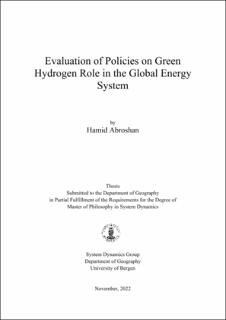Evaluation of Policies on Green Hydrogen Role in the Global Energy System
Master thesis

View/
Date
2022-11-29Metadata
Show full item recordCollections
- Master theses [125]
Abstract
Background: In some industries, the use of hydrogen as an energy carrier is necessary to decarbonize the global energy system. Green hydrogen is currently too expensive. The problem is that our knowledge of how to invest in green hydrogen technologies to ensure their future is limited. The choice made by investors today could either guarantee or demolish the future of green hydrogen by making it less competitive than other energy sources. Method: Share of hydrogen was obtained from a competition between energy technologies based on their energy costs. Capital costs, operating costs, and efficiency of them were found from concepts of "learning by doing" and "economy of scale". Each technology's exponents were roughly calculated using data. A factor was also introduced to demonstrate the resistance to using a technology. The effects of various subsidizing levels and the carbon tax were then studied. Results: Subsidizing green hydrogen is not enough. Even with high subsidises, market share of hydrogen will be negligible in 2050. Governments shall invest to reduce the resistance against hydrogen as an energy carrier. Conclusion: Expanding infrastructures and reducing social resistance is crucial for not only green hydrogen market, but also to be closer to a fossil fuel free global energy system.